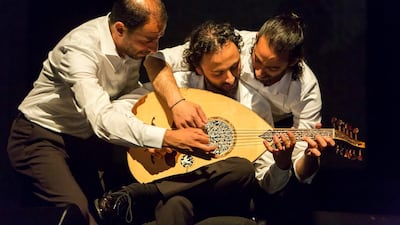For Le Trio Joubran, the bond the members share is both in blood and talent. The three-piece oud crew – brothers Samir, Adnan and Wissam Joubran – have carved themselves a pioneering position among regional and western audiences. In the Arab world, they are one of the few acts considered stars in the world-music scene, while to western ears the group acts as a gateway to Palestine's rich musical traditions. Since their sterling 2004 debut Randana, the group have released five recordings, including the soundtrack – full of their snaky bewitching melodies and fiery oud playing – for the 2009 French film The Last Flight. They evoke the passion and loss of their homeland in ways the voice cannot articulate. And that has been the most satisfying element of their success, says the 43-year-old, ever-so eloquent Samir, who is the eldest brother and the group's leader. We are chatting at the recent Mawazine Festival in the Moroccan capital of Rabat. He views Le Trio Joubran as a shot in the arm for the regional music industry, which seems to focus more on finding stars than nurturing talent.
“I don’t mean disrespect to the singers out there, but the singer is a dictator when it comes to the Arab art world,” says Samir. “We know that the people with real skill and knowledge are the musicians, but the way it is now, it is always the singer that’s the star. My goal has always been for the oud to be the star of the show, and to get the music out there to as many people as I can.”
Interestingly, the genesis of the instrumental group, who are originally from Nazareth, can be traced to the evocative words of the late Palestinian poet and author Mahmoud Darwish. After studying at a conservatory in Paris, Samir’s first foray into the music industry came in 1996, when he was tasked with providing musical accompaniment to a live reading by Darwish. It was the beginning of a 12-year spell that would shape the brothers.
“It was some of the best experiences of my life,” Samir says. “Every day was like going to a university and I would listen to his words and it would inspire me to construct musical sentences.”
With his brothers joining him in support, Samir says that Darwish became a mentor for the group. But the biggest lessons had nothing to do with music.
“He helped us understand who we are as artists. He taught us the very important lesson of not to be Palestinian artists, but artists from Palestine,” says Samir.
“The difference is important. He said that to excel yourself artistically, we need to be free from the stress and heartache of the situation in Palestine, which is never too far from our minds.”
Realising they could never top that experience, Le Trio Joubran have not supported another artist since Darwish’s death in 2008.
“It wasn’t an official decision, it was just a feeling. It didn’t feel right,” says 33 year-old Wissam. “I mean, how can you follow someone like Mr Darwish.”
They continue to pay tribute to the poet by performing a handful of tracks, most notably in the moving piece Masar, with a voice-over of Darwish reading his poetry.
While the group felt empowered by Darwish’s encouragement to be themselves, they never really had an option when it came to career choice.
They were born, as Samir puts it, to a family “that’s crazy about the oud”.
Their mother, Ibtisam Hanna, was a folk singer, and their father, Hatem Joubran, was from a long family line of luthiers. It is Wissam who has continued that family tradition. He is an in-demand luthier, having graduated cum laude from the renowned Antonio Stradivari conservatory in Cremona, Italy.
“He makes our ouds,” says 31 year-old Adnan proudly, before quickly adding “he keeps the best one for himself of course.”
“Of course,” Wissam says, not entirely in jest.
It is that friendly competition that is the hallmark of a Le Trio Joubran performance. Backed by long-term percussionist Youssef Hbeisch from Galilee, concerts feature the crew having a musical discussion on stage. On one hand they can be playful: the track Laytana has them encouraging each other to improvise with more inventive melodies. In the spell- binding Nawar, the trio are passing riffs onto each other so fast it’s almost impossible to know who is playing what note, while the pastoral Shajan has them locking into a solid groove as they take us on a journey over the mountains and olive groves of Palestine.
Samir says the shows are meant to be a musical voyage.
“That’s what we are trying to do with our music,” he says. “To take people on a journey with our oud from history to the present. From the elderly to the young.”
With a new album due to be released next year, their first since 2011's Asfar, Samir says to expect a packed touring schedule, with a return to the UAE on the cards.
“We want to take our shows to as many places as possible,” he says. “You know, it’s not just about performances. We hope our shows act as a dialogue from one culture to another.”
• Next week on the Mawazine sessions, the Jamaican ska pioneer Ernest Ranglin
sasaeed@thenational.ae


